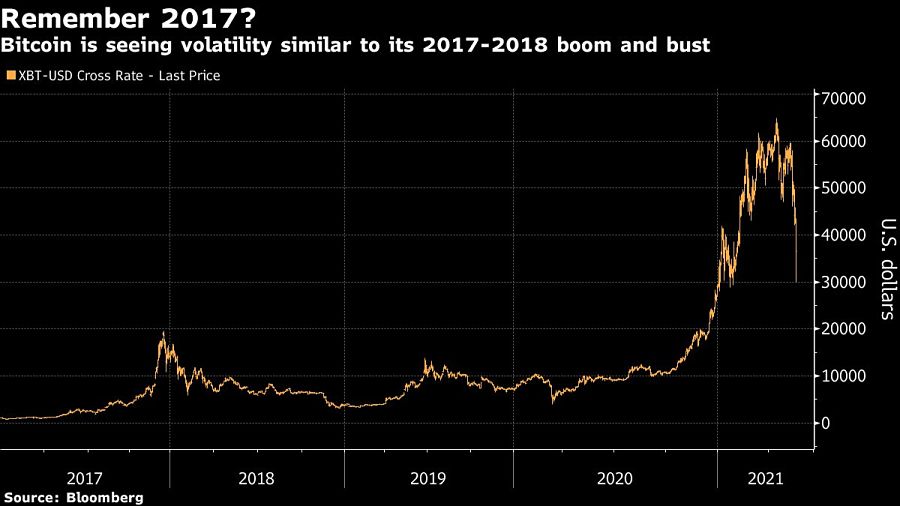

Like many things in markets, Bitcoin managed to maximize the pain. Its rise went on just long enough to pull in a bunch of otherwise sensible money. And then it made them pay.
The siren song reached a peak with Coinbase Global Inc.’s market debut on April 14. The direct listing of the largest U.S. crypto exchange supercharged theories that crypto had made it to the investing mainstream, that Wall Street’s embrace lent legitimacy to the asset class and the sky was the limit. Retail investors flooded in.
Veterans of the 2017 Bitcoin bubble no doubt had flashbacks. Back then, when the token dominated holiday conversations as its year-to-date gains approached 1,800%, CME Group Inc. ushered Bitcoin into the mainstream with the introduction of the first contract on a U.S.-regulated exchange. The debut, on Dec. 17, sent Bitcoin to a record $19,511 the next day. But pressures from the increased scrutiny from regulators around the world caused the coin to plunge about 40% by Jan. 17.

A similar dynamic is seemingly at play now as Bitcoin falls back to earth, with sell-offs spurring more sell-offs.
“The expansion of the holder base has been remarkable over the past year, especially thus far in 2021,” said Michael O’Rourke, chief market strategist at JonesTrading. “New speculators are learning for the first time what happens when a bubble pops.”
The largest cryptocurrency at one point on Wednesday lost 31% to drop close to $30,000, less than half of its record of almost $65,000 in April.
“The crypto bubble has started to unravel and data from different exchanges suggest that retail investors are capitulating,” Vanda Research analysts Ben Onatibia and Giacomo Pierantoni wrote in a note Wednesday.
They found that speculative activity in Bitcoin started to drop in April, as the open interest in Ether futures rose. Then, leveraged positions in both currency futures fell sharply last week.
That’s when Elon Musk posted a mass of head-spinning tweets criticizing Bitcoin’s energy use. The coin had gained after Tesla Inc. disclosed on Feb. 8 that the company had bought $1.5 billion of the coins and signaled intent to start allowing it as a way to pay for vehicles.
Bitcoin’s sell-off continued Tuesday following a statement from the People’s Bank of China reiterating that digital coins can’t be used as a form of payment.
New entrants to crypto are especially running for the exits, according to a note from Glassnode Insights. About 23% of crypto wallets are now at a loss, and 1.1 million of the addresses have spent all coins they held during this correction.
“It speaks to some of the speculative excess that built up in thematic-type investments, whether you’re talking about some of the hyper-growth companies or Bitcoin,” said Dan Russo, portfolio manager at Potomac Fund Management. “That story got super hot and some of that speculative excess is rolling off.” He added that a case could be made the current episode is a repetition of what’s been seen in speculative manias throughout history.
Adding insult to injury, on Wednesday European Central Bank Vice President Luis de Guindos warned that crypto assets shouldn’t be seen as a “real investment” because their underlying value is hard to discern, and market participants should brace for more price swings.
“Cryptocurrencies clearly won’t reach full potential unless they can penetrate the mainstream -- all of that momentum seems to be reversing itself in the face of Tesla’s mood change, China’s new stance and the likelihood of eventual regulation on the U.S. side,” said Mike Loukas, chief executive officer at TrueMark Investments.

Rajesh Markan earlier this year pleaded guilty to one count of criminal fraud related to his sale of fake investments to 10 clients totaling $2.9 million.

From building trust to steering through emotions and responding to client challenges, new advisors need human skills to shape the future of the advice industry.

"The outcome is correct, but it's disappointing that FINRA had ample opportunity to investigate the merits of clients' allegations in these claims, including the testimony in the three investor arbitrations with hearings," Jeff Erez, a plaintiff's attorney representing a large portion of the Stifel clients, said.

Chair also praised the passage of stablecoin legislation this week.

Maridea Wealth Management's deal in Chicago, Illinois is its first after securing a strategic investment in April.
Orion's Tom Wilson on delivering coordinated, high-touch service in a world where returns alone no longer set you apart.
Barely a decade old, registered index-linked annuities have quickly surged in popularity, thanks to their unique blend of protection and growth potential—an appealing option for investors looking to chart a steadier course through today's choppy market waters, says Myles Lambert, Brighthouse Financial.
